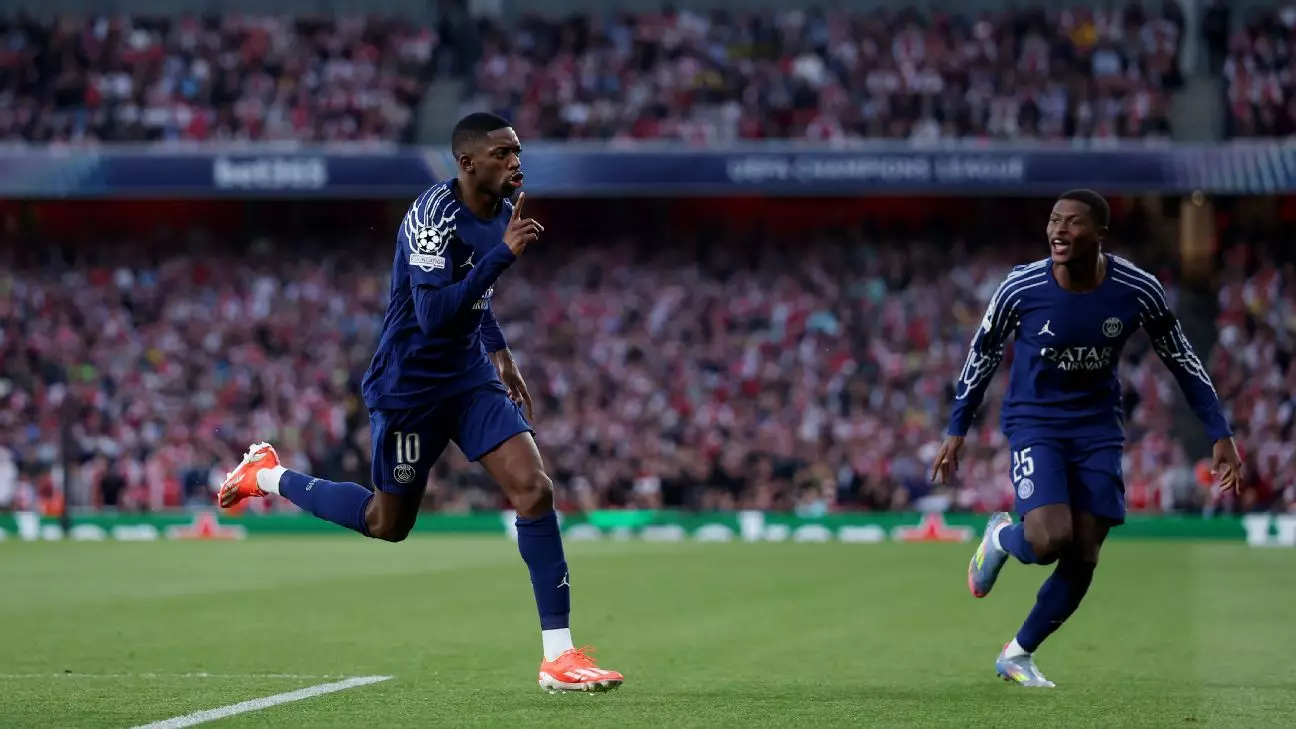In a high-stakes duel at the Emirates Stadium, Ousmane Dembélé emerged as the hero for Paris Saint-Germain (PSG), securing a slender 1-0 lead against Arsenal in the first leg of their UEFA Champions League semifinal. This match, marked by palpable tension and intensity, was pivotal not just for the competitive spirit between the clubs, but also for the narrative arcs of both teams in European football. PSG’s victory could well mark the defining moment in their pursuit of a long-elusive Champions League title, especially with Dembélé’s form reminiscent of the greats — standing out with his remarkable tally of 45 goal involvements this season alone.
Dembélé’s footwork and clinical instincts were on full display, as he scored with precision early in the match. However, the victory was overshadowed by a minor injury concern that saw him limping off in the second half — a reminder of the fragility that can come with high-stakes matches. His health is now a focal point as the team prepares for the second leg in Paris, but one cannot ignore the impact of his performance on PSG’s charge toward the finals.
Arsenal’s Missed Opportunities
While PSG celebrated their lead, Arsenal was left to ponder a myriad of missed opportunities that could have shifted the match’s outcome. Their efforts were met with solid resistance from PSG’s goalkeeper Gianluigi Donnarumma, who made several crucial saves that kept the Gunners from leveling the score. Notably, Mikel Merino’s disallowed goal added salt to the wound, highlighting a night of near misses for the Arsenal squad.
The narrative for Arsenal extends beyond this match, echoing in their decision-making from the previous transfer windows. Their lack of a striking option in recent summers has finally caught up with them. Given that they had previously failed to secure a reliable striker, the current squad configuration now presents a limited range of tactical options, especially when under pressure or facing injuries. Their performance might now serve as a proverbial eye-opener, proving that building a robust squad is as crucial as assembling a first eleven.
Unwavering Faith in Youth at PSG
Luis Enrique’s tactical brilliance has been increasingly evident as PSG slowly shifts from a reliance on superstars to a more cohesive unit of youthful talent. By embedding a strategy that favors technique and speed, Enrique has redesigned PSG into a team that not only contends but thrives in high-pressure situations. This approach shines through when viewing how Dembélé, among other young talents, has evolved into a pivotal influencer on the field.
Arsenal, in contrast, appeared bogged down, especially as key players were deployed out of position due to injuries. The replacement strategies, while often successful, did not quite find the desired impact against a PSG side that demonstrated agility and cohesion. One can speculate that had Arsenal managed to strengthen adequately in the previous transfer periods, they might not be looking up at a deficit now, but rather cherishing the prospect of advancing to the final.
The Creative Clash of Wingers
Another striking subplot of this match was the head-to-head competition between wingers Bukayo Saka and Khvicha Kvaratskhelia. The expectations were sky-high as these two promising stars took to the field. While Kvaratskhelia played a significant role in PSG’s early goal and continued to exhibit flair throughout the match, Saka’s influence waned against a well-organized defense. This was an opportunity for Saka not only to assert his position as a prospective star but also to fuel conversations about his rightful place among Europe’s elite.
As exciting as individual matchups can be, both players carried the weight of aspirations not just for their own careers but for their respective teams. Kvaratskhelia’s performance resembled a message to the footballing world that PSG are not just about star power; they are coherent and devastatingly effective, capable of dismantling even the finest defenses.
Squad Depth and Tactical Limitations
One of the glaring shortcomings exposed during the semaphore clash was Arsenal’s squad depth. As injuries depleted options on the bench, Arsenal appeared to lag behind the tactical dynamism displayed by PSG. While the French giants brought on expensive signings Barcola and Ramos as fresh leg options, Arsenal could only rely naively on youth, showcasing the transactional imbalance that currently bespeaks their tactical philosophy.
This struggle emphasizes a key lesson in both the realms of football and business: a team’s depth is paramount. Often, a title run hinges less on the core players but rather on the robustness of the entire roster. As Arsenal prepares for the second leg in Paris, the strategic decisions made now will define their narrative in the Champions League and their ability to rebound from this defeat.
With the second leg approaching, both PSG and Arsenal confront the urgency of circumstance. PSG will want to solidify their advantage, while Arsenal must rekindle their spirit. The stage is set for a thrilling continuation of this European saga.

